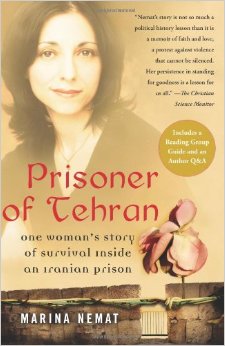When she was a 16-year-old Iranian student, Marina Nemat was arrested for crimes against the Iranian government and sent to the notorious Evin Prison, where she was beaten, tortured and condemned to die. Her miraculous story of survival is told in the stunning PRISONER OF TEHRAN. Here she discusses how she finally came to write about that time.
The evening I came home after having been a political prisoner in Evin Prison in Tehran, Iran, I sat at the dinner table with my family and watched in astonishment as they talked about the weather. I had been incarcerated for 2 years, 2 months, and 12 days. I was eighteen years old. They didn’t want to know the details of what had happened to me behind bars; it was too much for them to bear. Not that I was ready to explain everything about the torture and rapes that I had endured and the death of my friends, but I needed to know that when I was ready to talk, they would be willing to listen. But the offer never came – so I decided to play along and forget. I didn’t know that one cannot cut away the past and discard it like a tumor. Trauma cannot be put in a box and buried.
After prison, my life was still a battle for survival. I couldn’t return to school to get my high school diploma; even if the government let me go back, I couldn’t tolerate more propaganda and knew that I would react, speak out, and end up in prison again. So I studied at home with the help of my boyfriend, Andre. We soon decided to get married, which was very dangerous, because under extreme pressure and threats, I had converted to Islam from Christianity in prison, and the government of Iran now considered me a Muslim. According to Islamic law, a Muslim woman is not allowed to marry a Christian man; if she does, she could be condemned to death. And if I informed the government that I had converted back to Christianity, which was exactly what I had done, I would be considered a mortad, a traitor, and would, again, be condemned to death. Andre and I fought one battle after another, and, with the grace of God, we won every single one of them, even if by very small margins.
After we finally managed to leave Iran about 6 years after my release, our son became very ill, and we were afraid that he would die, but he recovered after rounds of treatment at the Hospital for Sick Children in Toronto. So, for years, all my mental and physical energy were used up for survival. It was only after we established a new life in Canada and when we began to feel almost “normal”, I found myself thinking about the past. I started having nightmares and had a psychotic episode, and this was when I realized that I had to face my past. Having been an avid reader all my life, I decided to write. Writing was my way to deal with post-traumatic stress disorder (PTSD), which even though dormant for many years was now threatening everything I had worked so hard for: my family and what was left of my sanity. I needed closure.
In order to write about the past, I had to revisit it. I knew that I had to enter my pain in order to effectively put it on paper. As I wrote about the torture, my feet and my body ached. As I wrote about the rape, I sometimes had to run to the bathroom, lock the door behind me, and scream. I was not quite sure if I would be able to finish the manuscript, but I did.
When my first memoir, Prisoner of Tehran, was released in 28 countries, and I saw it on bookshelves all over the world as I traveled to give talks about my experiences of prison and the terrible state of human rights in Iran, I expected to feel better. I wanted to wake up one day and be fine with no residual pain. But it didn’t happen. Gradually, I discovered that “closure” is the most stupid word in the English dictionary; one cannot close an immense amount of suffering. I had to accept my new identity as a witness to be able to live free and in peace. The crimes against humanity that I had witnessed were ongoing. In Iran, prisoners of conscience were and are still tortured and killed. As a witness, my life would be meaningless if I don’t testify. It is my duty to make sure that the world knows and remembers.
It’s difficult to speak and write about torture every day, but my only other option, which is silence, is even more painful. When I take even one day off, I feel like I’m suffocating. Every minute matters; every breath counts. I cannot allow myself to waste even a minute of my life when I know that innocents are suffering and dying, so I try to put my life to good use by giving talks, writing, teaching, and working with various human rights organizations.






